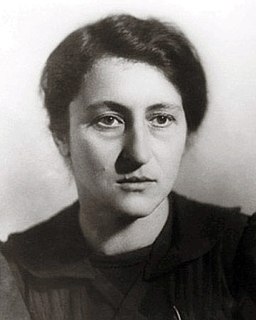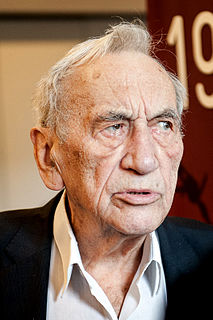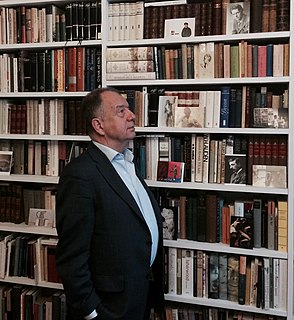
Solidarity, full name Independent Self-Governing Trade Union "Solidarity", is a Polish trade union founded in August 1980 at the Lenin Shipyard in Gdańsk, Poland. Subsequently, it was the first independent trade union in a Warsaw Pact country to be recognised by the state. The union's membership peaked at 10 million in September 1981, representing one-third of the country's working-age population. Solidarity's leader Lech Wałęsa was awarded the Nobel Peace Prize in 1983 and the union is widely recognised as having played a central role in the end of Communist rule in Poland.

Adam Michnik is a Polish historian, essayist, former dissident, public intellectual, and editor-in-chief of the Polish newspaper, Gazeta Wyborcza.

The Polish People's Republic was a country in Central Europe that existed from 1947 to 1989 as the predecessor of the modern Republic of Poland. With a population of approximately 37.9 million near the end of its existence, it was the second-most populous communist and Eastern Bloc country in Europe. It was also one of the main signatories of the Warsaw Pact alliance. The largest city and official capital since 1947 was Warsaw, followed by the industrial city of Łódź and cultural city of Kraków. The country was bordered by the Baltic Sea to the north, the Soviet Union to the east, Czechoslovakia to the south, and East Germany to the west.

The Polish Round Table Talks took place in Warsaw, Poland from 6 February to 5 April 1989. The government initiated talks with the banned trade union Solidarność and other opposition groups in an attempt to defuse growing social unrest.

Wanda Wasilewska, also known by Russian name Vanda Lvovna Vasilevskaya, was a Polish and Soviet novelist and journalist and a left-wing political activist. She was a socialist who became also a devoted communist. She fled the German attack on Warsaw in September 1939 and took up residence in Soviet-occupied Lviv and eventually in the Soviet Union. She was the founder of the Union of Polish Patriots there and played an important role in the creation of the 1st Tadeusz Kościuszko Infantry Division. The division developed into the Polish People's Army and fought on the Eastern Front during World War II. Wasilewska was a trusted consultant to Joseph Stalin and her influence was essential to the establishment of the Polish Committee of National Liberation in July 1944 and to the formation of the Polish People's Republic. Wasilewska negotiated with Stalin Poland's post-war borders. The borders attained conformed to Wasilewska's views of where they should be and represented the furthest extension of the country's territory that could be considered at the time, from the point of view of the Soviets and of the Western Allies.

Tadeusz Mazowiecki was a Polish author, journalist, philanthropist and Christian-democratic politician, formerly one of the leaders of the Solidarity movement, and the first non-communist Polish prime minister since 1946.

The Polish Socialist Party is a socialist political party in Poland.

The history of Poland from 1945 to 1989 spans the period of Marxist-Leninist regime in Poland after the end of World War II. These years, while featuring general industrialization, urbanization and many improvements in the standard of living, were marred by early Stalinist repressions, social unrest, political strife and severe economic difficulties.

Tygodnik Powszechny is a Polish Roman Catholic weekly magazine, published in Kraków, which focuses on social, cultural and political issues. It was established in 1945 under the auspices of Cardinal Adam Stefan Sapieha. Jerzy Turowicz was its editor-in-chief until his death in 1999. He was succeeded by Adam Boniecki, a priest.

Wojciech Stefan Roszkowski OOB is a Polish economic historian and writer, specializing in Polish and European history of the 20th and 21st century. He was a politician and Member of the European Parliament (MEP) in 2004–2009. From 1980 to 1983 he was a member of the independent self-governing trade union Solidarność. From 1990 to 1993 he served as vice-rector of Warsaw School of Economics.

Tomasz Strzembosz was a Polish historian and writer who specialized in the World War II history of Poland. He was a professor at the Polish Academy of Sciences Institute of Political Studies, in Warsaw; and, from 1991, at the John Paul II Catholic University of Lublin. Strzembosz was a resident of Warsaw, Poland.

Prof. Andrzej Paczkowski is a Polish historian. Professor of Collegium Civitas, director of Modern History Studies in the Political Institute of Polish Academy of Sciences, member of Collegium of Institute of National Remembrance.

Kazimierz Pużak (1883–1950) was a Polish politician of the interwar period. Active in the Polish Socialist Party, he was one of the leaders of the Polish Secret State and Polish resistance, sentenced by the Soviets in the infamous Trial of the Sixteen in 1945.

Kornel Andrzej Morawiecki was a Polish politician, the founder and leader of Fighting Solidarity, one of the splinters of the Solidarity movement in Poland during the 1980s. His academic background was that of a theoretical physicist. He was also a member of the 8th legislature of the Sejm, of which was also the Senior Marshal on 12 November 2015. His son Mateusz Morawiecki is the Prime Minister of Poland and a former chairman of Bank Zachodni WBK.

Jerzy Stanisław Holzer was a Polish historian. He specialized in the Polish history, German history, and the Polish-German relations.

Krzysztof Łoziński is a Polish writer, publicist, alpinist, teacher and anti-communist opposition activist in Polish People's Republic.

Wojciech Karpiński was a Polish writer, historian of ideas and literary critic.
Irena Lasota is a Polish philosopher, publicist, publisher, social and political activist, and president/co-director of the Institute for Democracy in Eastern Europe. Lasota began her political activism as a student in Poland during the 1968 Polish political crisis, which pitted protesting students against the then-Communist government. Soon after the so called March events, Lasota would emigrate to the United States, eventually returning to Europe in the first half of the 1980s to settle down in France. Lasota is to this day a frequent commentator on Polish and American political affairs, and remains an outspoken supporter of freedom of speech and democratic institutions.

Adam Szymon Pragier was a Polish economist, Doctor of Jurisprudence professor at the Free Polish University, socialist activist, politician, member of the Polish Legions and writer. A minister of information and documentation in the Polish government-in-exile in London, he upheld for the rest of his life its legal continuity in the struggle for the restoration of Poland as a sovereign state.
The dissident movement in the Polish People's Republic was a political movement in the Polish People's Republic whose aim was to change the political system from unitary Marxist–Leninist government imposed by the USSR to democratic form of government.


















